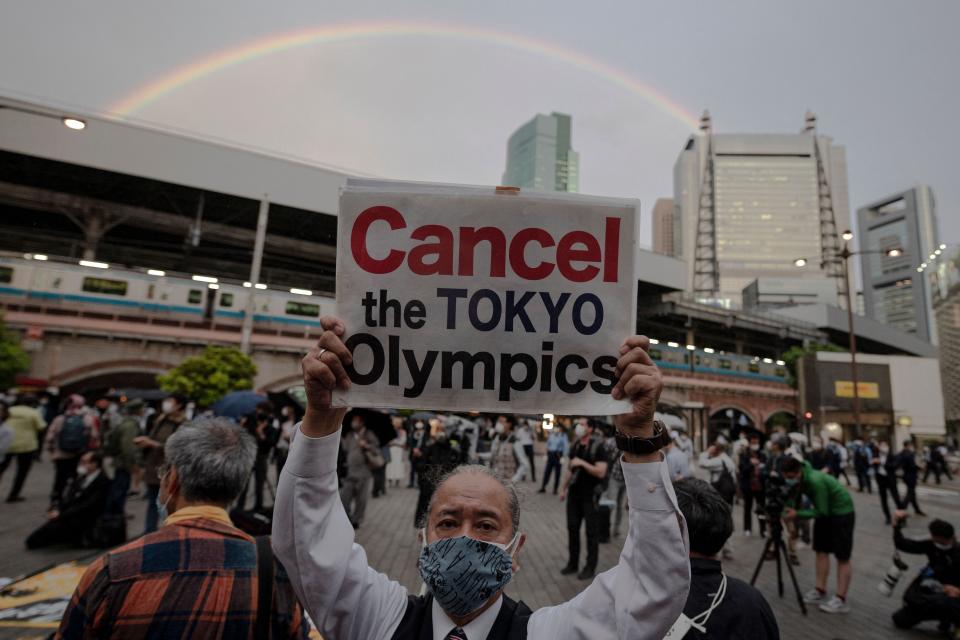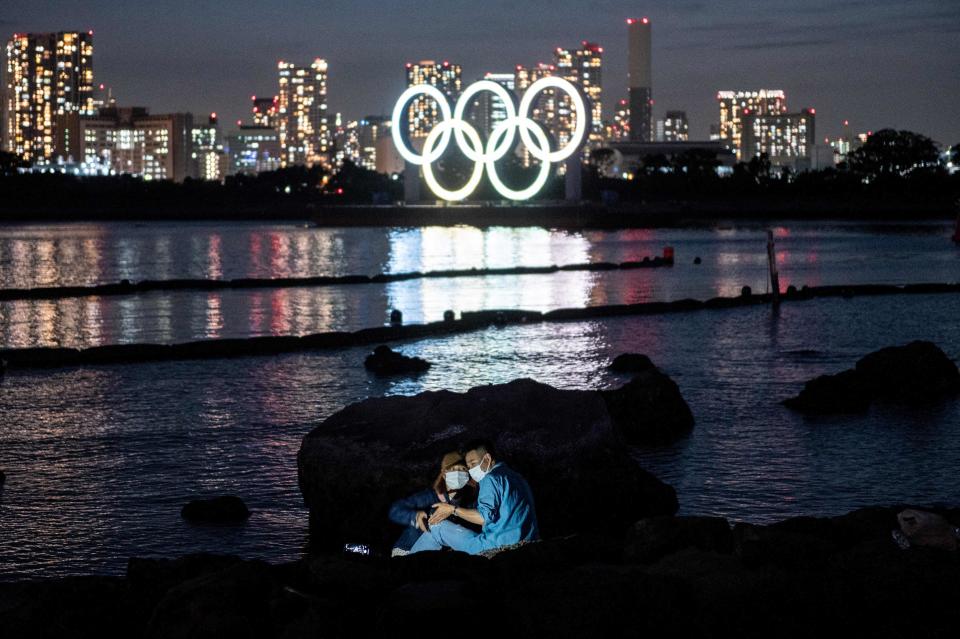'A ridiculous idea': Japan growing anxious ahead of controversial Tokyo Olympics
When Tokyo was awarded the 2020 Summer Olympics at a meeting in Buenos Aires nearly eight years ago, members of the Japanese delegation hugged one another and screamed with joy. Some were so happy they started to cry. In Tokyo, where it was 5 a.m., a group of 1,200 dignitaries and athletes at a convention hall erupted into cheers.
"The joy was even greater than when I won my own election," Shinzo Abe, then Japan's prime minister, said at the time.
Now, after a yearlong delay, those long-awaited Summer Olympics are quickly approaching, with the opening ceremony just a little more than two months away.
But in Japan, the excitement of eight years ago seems to have been replaced by anxiety.
As COVID-19 continues to spread both domestically and around the world, recent polls in Japan indicate that between 60% and 80% of residents believe the Tokyo Olympics should not be held as scheduled this summer. A petition calling for the Games to be canceled has generated more than 350,000 signatures. And criticism among members of the Japanese medical community is growing louder by the week.
"Japan is not ready to hold such a big event given the current situation of (the) COVID pandemic," Kentaro Iwata, a professor of infectious diseases at Kobe University in Japan, wrote in an email to USA TODAY Sports. "The world, likewise, is not ready, too."

With case numbers surging and vaccination efforts lagging, the Japanese government has declared a state of emergency in a large swath of the country – including Tokyo – and extended it through the end of May.
And there are lingering questions in Japan about how the country can effectively fight COVID-19 while also welcoming thousands of athletes, coaches and media members from around the world to Tokyo.
The International Olympic Committee and local organizers in Japan have continued to profess confidence that the Games will take place as scheduled, beginning July 23. They say athletes will be encouraged but not required to be vaccinated prior to competition, and they have outlined a series a countermeasures that will be implemented to prevent the spread of COVID-19.
"We are moving full ahead," IOC spokesperson Mark Adams said last week. "There has been a small extension of the emergency situation (in Japan), but we continue to plan for full Games. That’s the way it has to be, and that’s the only way it can be for us."
The COVID-19 situation in Japan
Japan has fared better than most in its fight against COVID-19, with only nine deaths from the disease per 100,000 residents – for a total of roughly 11,500 overall. But in recent months, case numbers have surged. From March 1 to Saturday, the average number of daily new cases in Japan increased 528%.
And the country's sluggish vaccine rollout has only made matters worse.
Even as international data about the efficacy of vaccines became available last winter, Japan was slow to approve vaccines for domestic use. It did not start inoculating its residents until mid-February and is still in the process of distributing vaccines to its most vulnerable populations, including health-care workers and senior citizens.
As of last week, less than 2% of Japan's population had been fully vaccinated.
Iwata, the infectious disease expert, said Japan plans to finish vaccinating its high-risk populations by July. But even then, he added, the majority of residents will not be inoculated – "and (the) spread of the disease will not be prevented significantly."
Jason Karlin, an associate professor at the University of Tokyo, described the COVID-19 situation in Japan as "arguably more dire than at any time since the start of the pandemic," citing a growing complacency among the population.
"Whereas the early days in the pandemic saw greater self-restraint and discipline, there is now a growing sense of resignation with life under COVID-19," Karlin wrote in an email.
"Unlike the US where the widespread availably (sic) of vaccinations has buoyed optimism regarding the future, there is little sign of short-term relief."
'Disillusion and cynicism'
Karlin, who specializes in media and gender studies, said local media coverage surrounding the Olympics has become increasingly critical in Japan, with COVID-19 continuing to dominate public discourse and overshadow typically-lighthearted stories.
Take the Olympic torch relay. The world's oldest living person – 118-year-old Kane Tanaka – was scheduled to carry the torch as it passed through her hometown earlier this month. Instead, she pulled out of the event, citing COVID-19 concerns. And her town later canceled its leg of the relay altogether, for the same reason.
"The prevailing sentiment today in Japan surrounding the upcoming Olympics is marked by growing disillusion and cynicism," Karlin wrote in an email.
In a recent survey conducted by The Asahi Shimbun, a national newspaper in Japan, 83% of respondents said they believed the Games should be either canceled (43%) or postponed a second time (40%). The figures marked a combined 14-point jump from April, when 69% supported canceling or postponing the Games.
In a second poll, published Sunday by Japanese news agency Kyodo News, 59.7% of respondents said the Games should be canceled, while an additional 25.2% believed they should be held without spectators.
Adams, the IOC spokesperson, said the organization is aware of the polling numbers in Japan and that "we take note of public opinion." But he hopes those perspectives will shift as additional information is released.
"I think that you will see, when (the Olympics) do go ahead and when there is an amazing moment, that will (also) be reflected in public opinion," he said.

'A big tsunami'
For much of the Japanese population, concerns about the Olympics come back to resources. In the midst of COVID-19, some wonder, should Japan be diverting health-care resources – from doctors and nurses to hospital beds – to help with the Games?
Iwata said many doctors and nurses who are actively caring for COVID-19 patients in Japan believe the decision to hold the Games is "a ridiculous idea." And last week, a union of Japanese doctors submitted a statement to the government, asking that the Games be canceled and calling it "impossible" to hold the Olympics in a safe manner with the virus – and its variants – continuing to spread.
"This is a tough thing for the athletes, but somebody has to say it," union representative Naoto Ueyama said at a news conference, according to The Asahi Shimbun.
A second group, the Tokyo Medical Practitioners Association, echoed those comments in a letter published Monday. According to a translation of the letter by Reuters, the group said Tokyo's hospitals "have their hands full" and "have almost no spare capacity" due to the recent influx of COVID-19 infections.
Seiko Hashimoto, the president of Tokyo 2020's organizing committee, said in a news conference late last week that organizers have not yet determined how many health-care workers will be needed at the Games. She said staffing needs will depend in part on whether there will be any fans in attendance.
While organizers have said that international fans will not be permitted, a decision on whether Japanese fans can attend – and, if so, how many – is not expected until next month.
But even empty stadiums come as little consolation to health-care workers, Ueyama said according to The Asahi Shimbun.
"It is like a big tsunami is approaching, but they say, 'It’s OK if we run to the second floor,'" he said.
Contributing: The Associated Press
Contact Tom Schad at tschad@usatoday.com or on Twitter @Tom_Schad.
This article originally appeared on USA TODAY: Olympics 2021: Tokyo Summer Games have Japan worried during COVID-19

